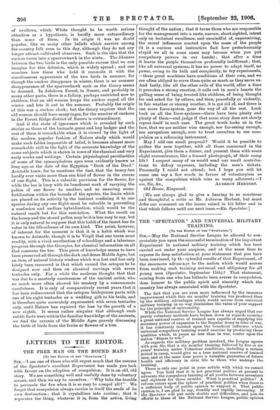LETTERS TO THE EDITOR.
THE FREE MAN OR THE BOUND MAN?
[To TER EDITOR OF THE "SPECTATOR.1
SIR,—I am one of those who will regret much that the success of the Spectator's excellent Experiment has made you look with favour on the adoption of compulsion. It is an old, old story. We.see something well and usefully done by voluntary means, and then we say to ourselves : "Why take the trouble to persuade the few when it is so easy to compel all ? " We forget that compulsion always carries in itself the seeds of its own destruction ; that it crystallises into routine ; that it separates the thing, whatever it is, from the active, living
thought of the nation ; that it turns those who are responsible for the management into a caste, narrow, short-sighted, intent only on technical excellence, and unmindful of, unperceiving, the moral influences erected upon the mass of the people (it is a curious and instructive fact/ how preterhumanly stupid we all in some cases may become when you put compulsory powers in our hands) ; that after a time it leaves the people themselves profoundly indifferent; that, like ull universal systems, it has no power to adapt itself, no power, owing to its bulk and complexity, to try experiments, —these great machines have conditions of their own, and we are often obliged to serve them quite as much as they serve us. And lastly, like all the other evils of the world, after a time it provokes a strong reaction, it calls out in men's hearts the galling sense of being treated like children, of being thought for and acted for by others, and then, peacefully or violently, in fair weather or stormy weather, it is got rid of, and there is one more force-system gone the way of all the rest. Look back on all the force-systems—there have been plenty and plenty of them—and judge if that same story does not slowly repeat itself in each case. The great truth looks us in the face, that we are neither wise enough, nor far-seeing enough, nor scrupulous enough, ever to trust ourselves to use com- pulsion as a reforming instrument.
May I add one small proposal ? Would it be possible to gather the men together, with all those concerned in the Experiment, give them a dinner, and present them with some slight remembrance, like a framed photograph, of their camp life F I suspect many of us would send our small contribu- tions to defray expenses, including the men's tickets. Personally I could not attend; but I hope you will let some one say a few words in favour of voluntaryism as against the compulsion which wins so many adherents.—I
am, Sir, &c., AIIBERON HERBERT. Old House, Ringwood.
LWe are always glad to give a hearing to so courteous and thoughtful a critic as Mr. Auberon Herbert, but must defer our comment on the issues raised in his letter and in that which follows until our next issue.--En. Spectator.]






































 Previous page
Previous page